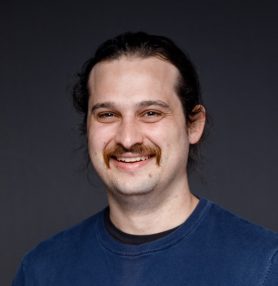Assistant Professor Tim Goudge Named Co-Director of CIFAR Research Group
April 3, 2025

Tim Goudge, an assistant professor in the Department of Earth and Planetary Sciences at the Jackson School of Geosciences, has been named a co-director of a geosciences research group at CIFAR, a private research foundation based in Canada that supports research spanning the natural and social sciences.
The group — called Earth 4D: Subsurface Science & Exploration — is made up of 17 interdisciplinary researchers studying Earth’s subsurface, the water cycle, the energy transition, planetary exploration, and space and time on a changing planet. They meet twice a year to present and discuss new findings.
As co-director, Goudge will help set the intellectual direction of the program, make research project recommendations, and bring in guests to help bridge gaps and catalyze discussions between researchers.
“It’s a really exciting opportunity to get to implement a scientific vision in a way that’s not often afforded to us,” Goudge said. “One of the beauties of being an independent researcher is that you get to work on the things that you think are cool and that you think are interesting and exciting. The opportunity to help lead Earth 4D is thus unique in that it is a way to have a broader scientific vision.”
In 2021 Goudge was named an Azrieli Global Scholar at CIFAR, a two-year appointment that allows early career researchers to participate in meetings and discuss findings with fellows, who make up the majority of the Earth 4D program. Periodically, new fellows are added to the group; Goudge and another former scholar were selected in 2024. Then Goudge was appointed as co-director of Earth 4D on April 1, 2025.
The group’s other co-director is Barbara Sherwood Lollar, a professor in the Department of Earth Sciences at the University of Toronto. She said Goudge brings an outstanding research profile that advances many of the interdisciplinary themes of Earth 4D.
“In addition to the research stature he brings to the group, he has always shown an extraordinary insight for identifying and developing novel research directions for our team, and a deft skill and boundless energy for supporting and enabling the creativity of colleagues and collaborators,” Sherwood Lollar said. “It takes a special person to step into a role which encompasses so many moving parts, but it was telling how excited each person involved in our group was to express support and enthusiasm for Tim as he takes on this role.”
Through his involvement with Earth 4D, Goudge has also received seed funding to study the Mackenzie River delta in the Canadian arctic, which could serve as an analog for how similar features on Mars were formed. Billions of years ago, the surface of Mars is thought to have been dotted with lakes that may have been ice-covered, Goudge said.
That research is co-led by Jacqueline Goordial, a geobiologist with Earth 4D, who is studying the organisms that live in this Arctic delta environment. Goudge’s group is studying the mechanics of the physical environment, such as how water and sediment move through the area.
This kind of interdisciplinary work is often more difficult to fund through traditional research grants because it doesn’t fit neatly into a programming subject, Goudge said. But this is exactly the kind of interdisciplinary research that CIFAR prioritizes. This gives researchers a mechanism to come at questions from a more creative and collaborative angle.
“CIFAR promotes very interdisciplinary science,” Goudge said. “They are very explicit that the work they want to fund should be things that are cross-cutting disciplines in some interesting way. This opens doors for much exciting new science, and it will be immense fun to help steer our Earth 4D group towards such interdisciplinary research questions as the new co-director.”
